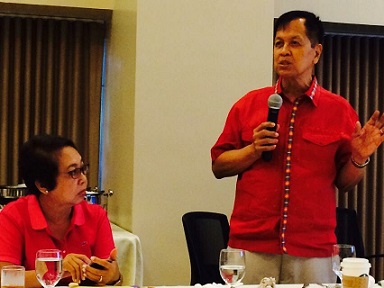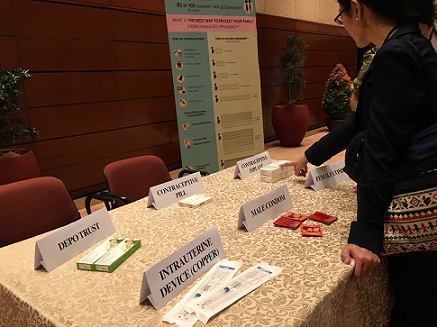By Diana G. Mendoza

A civil society organization advocating and promoting family planning has found a new champion in incoming President Rodrigo Duterte.
The Forum for Family Planning and Development Inc. (The Forum), a nongovernment organization that counts longtime experts of population and development in its leadership, welcomed Duterte’s plan to push strongly the Responsible Parenthood and Reproductive Health (RPRH) law that was enacted in 2012 during the term of outgoing president Benigno Aquino III.
Blasting the Catholic church for its opposition to the government family planning program, Duterte said he wants a three- children- per- family policy but clarified the next day that it would not be mandatory.
Benjamin de Leon, The Forum president, said Duterte’s announced policy is “sensible and well-timed especially now that the Philippines is experiencing a slowing population growth rate and Filipinos recognize the importance of family planning.”
“Enabling couples to phase the births and plan the number of children they want to have,… giving them free family planning methods that they want to use and educating them about the benefits of a well-planned family is an opportune moment to grasp. It is time to act fast and vigorously on family planning.” de Leon said.
To stress the urgency of a family planning, Duterte visited a couple in Davao’s depressed district with 11 children. The father was working as a jeepney barker.
Duterte instructed his executive assistant, Bong Go to give the couple a family planning kit.
De Leon said, “The RPRH Law allows public health centers to provide family planning methods and contraceptives such as condoms and pills to couples and individuals who need them.”
“The law also allows the teaching of sex education in schools to make children and young people understand sex, sexuality and reproductive health in a responsible manner that in the long term would influence them to make intelligent decisions later in life.”
He added that enabling the country’s enormous youth population to make more sensible life decisions will have longstanding effects on the country’s social and economic development.
The 2015 census pegged the Philippine population at 101.6 million. More than half at 52.7 percent are young people aged 24 and below.
De Leon said it is an opportune time to increase the momentum of the country’s family planning and reproductive health program by providing education and services to a wider segment of the population.
“From the very start, the welfare of Filipinos, whatever beliefs they have and faiths that they practice, is foremost in the goals of the country’s family planning and reproductive health program,” he said.

Duterte noted that family planning programs in the past had either been slow or were not implemented because of government leaders’ fear of Catholic bishops opposed to contraception and sex education.
The 2015 population census reported a continuing and slowing population growth rate nationwide of 1.72 percent, lower than 1.9 percent of the last census in 2010. A result of this decrease is the current population that is lower by half a million than what had been predicted by the last 2010 census of population and housing.
The Commission on Population (POPCOM) said in a statement that the declining rate could be attributed to increasing efforts to meet the family planning needs and reproductive health services for couples and individuals who want to limit or space their children in their reproductive years.
Past censuses and population studies had shown that Filipino women want only two children, but end up having four or more because of factors such as inaccessible reproductive health services, unequal relationship and marriage structures wherein males want more children than their females partners do, and religious and cultural reasons.
POPCOM executive director Juan Antonio Perez III said the Philippines “now has some time to cope with the increasing population since the time for the population to double has now gone up to 40 years from 38 in the last census.”
POPCOM noted that various factors can reduce population growth including increase in contraceptive prevalence rate within the five-year period 2010-2015, which indicates that up to 45 percent of couples, women and men are using a modern family planning method today.
It further said that 16 percent of women are using contraception to delay their next birth and 39 percent want to stop childbearing. The proportions are still low considering that the total demand for family planning of currently married women of reproductive age is 73 percent.
The Forum also lauded Duterte’s choice of Dr. Ernesto Pernia as secretary for socioeconomic planning and director general of the National Economic and Development Authority (NEDA).
Pernia, a reproductive health and rights advocate and University of the Philippines professor-emeritus in economics, is a member of the organization’s board of trustees that also includes fellow UP economics professor and former NEDA chief Felipe Medalla, former president Fidel Ramos, and UP professor-emeritus and national scientist Mercedes Concepcion, among others.





